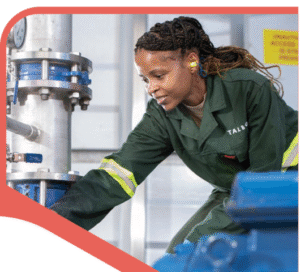What is your current area of specialisation within the field of engineering?
Although not a formally qualified engineer, I bring extensive experience and deep-rooted knowledge of the engineering world. Trained as a design draughtsperson, my career has taken me across a broad range of disciplines, including civil, structural, and piping, giving me a well-rounded perspective and versatile skill set.
Currently, I lead a Business Unit focused on Product Sales and Maintenance, where I oversee after-sales support and proactive service solutions. My team and I are dedicated to ensuring the continuity of our clients’ water operations through preventative maintenance strategies, helping to minimize downtime and optimize performance.
With a passion for problem-solving and a strong commitment to client success, I continue to build on my engineering journey, bringing both technical insight and a practical, customer-focused approach to every project.
How many years of professional experience do you have in engineering?
I have over 20 years of experience in the engineering industry, with a strong focus on the water and sustainability sectors.
What strategies or initiatives do you believe can help promote gender diversity and inclusion in the engineering industry?
Promoting gender diversity and inclusion in engineering requires intentional strategies that create supportive environments where women can thrive. One key initiative is fostering strong mentorship and sponsorship programs; having experienced leaders guide and advocate for emerging female talent makes a significant difference.
It’s also important to challenge outdated stereotypes and encourage women to view their unique perspectives and qualities as strengths rather than obstacles. Building inclusive cultures where women feel empowered to speak up, lead with passion, and contribute fully is essential.
Finally, showcasing successful female leaders and creating networks where women can connect, share experiences, and support one another helps build confidence and visibility, driving lasting change in the industry.
How do you approach professional development and continuous learning within your engineering field?
I approach professional development and continuous learning with a hands-on, industry-driven mindset. With over 20 years in the engineering sector, particularly in the water and sustainability space, I’ve learned the importance of staying adaptable and informed. I actively seek opportunities to expand my knowledge, whether through on-the-job problem-solving, cross-functional collaboration, or staying up to date with emerging technologies and industry trends.
Managing a Business Unit also requires me to stay sharp in areas like preventative maintenance, client support, and operational continuity. I regularly engage with both technical teams and clients, which helps me continuously refine my skills and broaden my understanding of evolving needs in the field.
Have you faced any unique opportunities or advantages as a woman in engineering? If yes, could you share some instances?
When I began my career over two decades ago, women were a rare presence in the engineering space, especially in drawing offices and on-site environments. I often encountered skepticism and was underestimated purely because of my gender. Those early challenges, though difficult, shaped my resilience and strengthened my determination to prove my capabilities through hard work and results.
Fast forward to today, and I’m proud to be part of a team at Talbot where women are not only present but thriving. In fact, women (various technical qualifications) make up 70% of our leadership team. I have the privilege of working alongside some of the strongest, most capable female engineers I’ve ever met. I believe women bring a powerful combination of passion, precision, and emotional intelligence to leadership, qualities that continue to elevate the standards of our work and culture.
Are there any specific engineering projects or accomplishments that you are particularly proud of? Please describe them briefly.
One of the most rewarding aspects of my career has been seeing my technical drawings come to life, turning concepts into real, functioning infrastructure. While I may not have designed the systems myself, I took great pride in detailing them with precision and care.
Today, in my current role, that sense of pride continues but from a different perspective. I now focus on the operational side, ensuring that water and wastewater treatment plants (WWTPs and WTPs) not only start up successfully but continue to run efficiently and reliably over time. Being part of a project’s full lifecycle, from detailed design to long-term performance, is incredibly fulfilling.
What are the key skills or qualities that you believe have contributed to your success in the engineering field?
Key skills that have contributed to my success in the engineering field include strong problem-solving abilities and the capacity to see the bigger picture. I approach challenges methodically and apply critical thinking to find practical, effective solutions.
Being naturally curious and committed to continuous learning has also played a vital role. I make it a priority to stay up to date with industry developments and to upskill regularly, which helps me remain adaptable and valuable in an ever-evolving environment.
How do you balance work-life commitments, particularly in a demanding field like engineering?
There’s no simple formula for balancing work and life, especially in a demanding field. However, I’ve found that truly enjoying what I do plays a big role in supporting my mental well-being. Passion for my work helps me stay motivated and grounded, even during high-pressure periods.
This year, I completed my first Comrades Marathon, an achievement that felt like a second job in itself. The training taught me invaluable lessons about endurance, discipline, and the power of a strong mindset. Those same principles help me maintain balance in my professional life, reminding me that with focus and resilience, it’s possible to meet both personal and professional goals.

